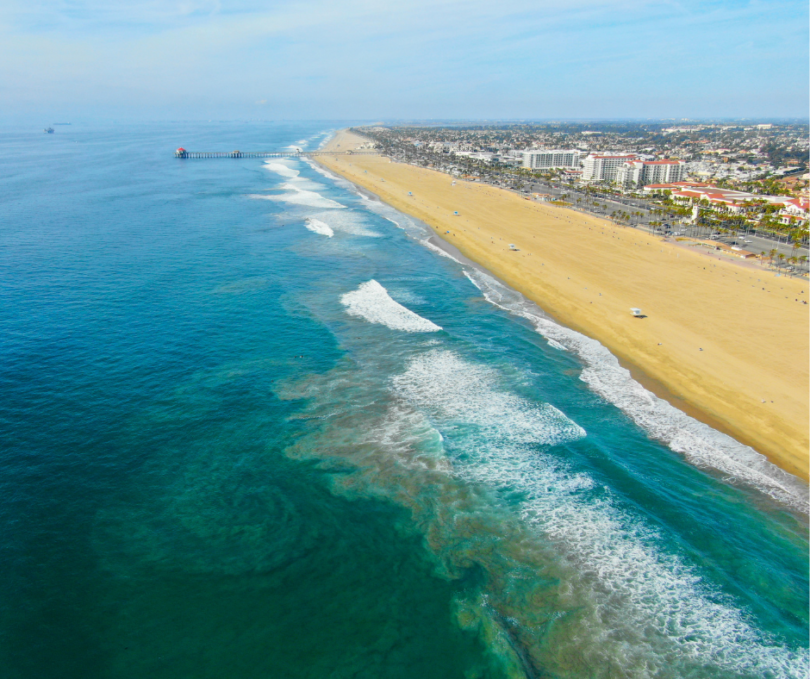The Invisible Killer at the Beach
Sunday, July 30th, 2023 was a beautiful day. Not a cloud in the sky. I sat on the Long Branch, New Jersey beach, excited to jump into the ocean for the first time this summer.
I walked into the relatively calm ocean and floated out, enjoying the cool water. Before I knew it, I was a good distance from the shore, and the water was suddenly pretty deep. So, I just treaded water and attempted to come in closer to the sand where I could stand.
It wasn’t working.
As much as I tried to swim towards the shore – I kept going out even further.
I decided that I was having some trouble. “Maybe I’m just not used to the ocean,” I thought to myself.I saw a lifeguard stand a little bit to the north of where I was stuck. So, as a precaution, I floated on my back parallel to the shore, so that I could be directly opposite the lifeguard stand. “If I somehow have a problem, they would be able to see me,” I said to myself. In the meantime, I continued trying to swim closer to the shore, to no avail.
Then I heard the whistle from the lifeguard stand instructing me to come closer in and stop floating north. I was a bit relieved that they saw me, and a bit embarrassed that I was one of those irritating, foolish, naughty swimmers who ignores the dangers and is just a big hassle for them.
So, I tried to do as I was told. I faced the beach, and swam as fast, as hard, and as ambitiously as I could. Yet, somehow, I was still the same distance from the beach. It wasn’t working and I was running out of breath.
So, I flipped on my back and tried to float backward into the beach, attempting to use the waves to take me in.
That didn’t work either – I continued to float away from the shore.
It was terrifying.
Suddenly, a lifeguard appeared behind me in the water with an orange buoy.
“How are you doing,” he yelled. “I am swimming as fast as I can, but I’m not. It’s not working!” I replied.
“We are in a riptide,” he said, “hold onto this buoy, and let’s get back to the beach.”
I had no idea what a riptide was, but I knew after about 15 minutes in the water with the lifeguard that we were both stuck out there in the ocean.
He asked me to assist and kick as hard as I could, and we finally got to a spot where I could feel the sand under my feet.
We walked out of the water together, and when I looked up, I saw over 100 beachgoers (who were breathlessly watching the whole scene), all standing up. When they saw us come out of the water together, alive, they all started clapping, applauding the heroism of the lifeguard to put his life at risk to go into the ocean and pull me out. I was touched.
A few minutes later, I walked back to find the lifeguard (“Michael Randazzo”). “Thank you for saving my life,” I said. I asked him for his cell and his home address. “My name is Jack Doueck. I am a grandfather of ten grandchildren. You saved my life today and I will never forget it.” He was so surprised at this gesture. “No need! You were doing good out there! We were just stuck in a riptide! It is no problem!” I said, “I would not be alive if not for you. Thank you.”
A riptide or rip current is a strong, narrow current of water that flows from the shore out into the ocean, extending beyond the breaking waves and into deeper water, pulling anything in its path out to sea. They can have a flow rate of up to 8 feet per second, which is faster than most people can swim.
According to the United States Lifesaving Association, riptides and rip currents are a primary hazard at the beach, leading to tens of thousands of rescues by lifeguards and over 100 drowning fatalities every year in the USA. The riptides are invisible – lifeguards can’t really see them from their posts, and they catch swimmers by surprise every time.
When caught in a riptide, swimmers are advised to remain calm, to float or try to swim parallel to the beach, and to never to fight the riptide (like I did) because that will lead to fatigue and drowning. The experts advise to try to let the waves bring you back to the shore naturally, but in my case, that was not happening.
Because the riptides are almost impossible to detect from the shore, they are invisible, and beachgoers swim in the ocean at their own peril. I swam in the ocean hundreds of times in my life without any lifeguard on duty.
I don’t think I will ever do that again. It just isn’t worth the risk.
I am so thankful to God for giving me another lease on life. I hope and pray I won’t blow it! I’m thankful to Michael Randazzo for his courage and kindness. And I’m thankful that I was swimming on a beach with a lifeguard.
For more information about how to protect your family from this invisible killer, click here: https://www.usla.org/page/ripcurrents
By: Jack Doueck, Chairman, Energy Marketing Conferences




